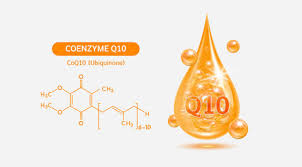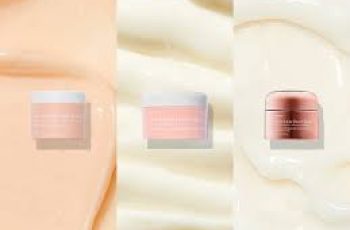
CoQ10 (Coenzyme Q10) in Skin Care
Coenzyme Q10 (Ubiquinone, CoQ10) is one of the most common, versatile, and popular ingredients in skin care. It is used in cleansers, moisturizers, toners, sunscreens, serums, skin lightening products, and more.
CoQ10 is notable for its anti-inflammatory, antioxidant, and mild tyrosinase inhibiting effects. It also has the unique ability to help the mitochondria in the cells make energy (ATP).
It is not a common allergen and has no notable topical side-effects. It is found naturally in the cells of organisms with mitochondria, as it is an essential compound in your body’s energy production cycle. (2)
Because CoQ10 only penetrates the first few layers into the skin on its own, it is best used in oil based products that help deliver it deeper into the skin.
Read below to find out all about how CoQ10 works to help you decide if its right for your custom skin care regimen!
Click here to see our full collection of Products with CoQ10!
What is CoQ10
CoQ10, (Coenzyme Q10 / Ubiquinone) is a “quinone” compound found in all cells of mitochondria containing organisms.
It is the only fat soluble antioxidant produced naturally within the body, and is not considered a vitamin like some other antioxidants (Vitamins C, & E). (2)
CoQ10 is essential in countless biological processes in living cells by contributing to the electron transfer chain (a key phase in your body’s energy production system). (4)
The chemical structure of CoQ10 was first determined by 1978 Nobel laureate in chemistry, Peter Mitchell, who described the many biochemical functions of CoQ10. (8)
Studies have found that CoQ10 is able to penetrate the skin and thereby impart benefits topically, meaning it is a good choice for skin care products. (21)
Products containing CoQ10 tend to have a yellow-tinted color; this is normal.
Even though it is in the “quinone” family of chemical compounds, it does not pose the same concerns or risks as hydroquinone.
Even though tons of research has been conducted on CoQ10, ingredients as ubiquitous as CoQ10 always need further research to support their regular use. (12,13)
To the benefit of CoQ10, it occurs naturally in basically all cells which means it is not a likely irritant for any skin type.
If you have wrinkles, sun damage, or dark spots, CoQ10 might be a great addition to your skin care routine.
Best Products with CoQ10
This antiaging serum pairs CoQ10 with probiotic lysates, and several forms of hyaluronic acid. This serum will hydrate skin and make other skin care products work better by increasing their absorption int the skin. The HA gives immediate improvement of fine lines while the CoQ10 helps skin cells repair themselves. This makes this serum good for the morning or at night.
This toner also has energizing CoQ10 and the humectant hyaluronic acid. It can be used before any antiaging serum to increase how well the antiaging serum works.
Benefits of CoQ10
CoQ10 is most commonly used in skin care products for its antioxidant, anti-inflammatory, and skin lightening effects.
Studies on live patients have shown that using CoQ10 products can reduce the presence of crows feet wrinkles, (27) but does not have as much evidence to support its use to treat wrinkles as retinoids and ascorbic acid do.
CoQ10 is good for anti-aging regimens because it aids in the production of collagen, the compound in your skin that gives it’s strength.
Creating more collagen in the skin helps alleviate wrinkles.
Many clinical investigations have found correlations (though not a definitive causative relationship) between low CoQ10 presence and various cancers. (3,42)
That being said, more research into cancer treatments is always needed and no single ingredient cures cancer on its own as far as science is currently aware.
CoQ10 is stable in sunlight, and stops collagen from breaking down from UVA radiation. (5)
Tyrosinase inhibiting properties have also been recorded in CoQ10, meaning it can be used to treat many kinds of hyperpigmentation.
The antioxidant and and anti-inflammatory properties of CoQ10 are good for skin concerns like psoriasis.
CoQ10 effects on collagen
Collagen is one of the compounds that make up your skin that gives it strength.
When used properly in skin care products, CoQ10 aids in the production of collagen in the skin because it gives cells the energy they need to make collagen.
On top of simply aiding in production of collagen, it also inhibits various proteinases like collagenase (8) which break down already existing collagen in the skin.
CoQ10 is one of the most common ingredients used in products designed to prevent and treat skin aging.
More collagen in the skin can result in smoother, fewer wrinkles, and more resilient skin.
Effects on skin cell mitochondria
CoQ10 is a critically important component of the cells’ energy production process; specifically it facilitates the electron transport chain portion of ATP synthesis.
Because CoQ10 helps the body produce energy, applying it topically has two effects on mitochondria:
Keep the skin from using anaerobic energy production systems that usually results in oxidizing lactic acid
Helps increase ATP production
CoQ10 works quickly. Studies have suggested that CoQ10 (ubiquinone) starts expressing anti-aging functions very rapidly after application.(37)
Whether its featured in your skin care regimen or not, CoQ10 is always a part of your body’s constant biological functions.
Side effects of CoQ10
Side effects
Taking CoQ10 supplements poses similar risks of side-effects to caffeine; jitteriness, appetite loss, diarrhea, and mild nausea. (30)
For this reason, if you decide to take CoQ10 supplements- take them in the morning to prevent insomnia.
That being said, these side-effects are uncommon (besides jitteriness), and even at high doses there has been no evidence of contact allergies or toxicity via ingestion. (17,31)
A significant allergy to CoQ10 alone is not common, but cross exposure allergies can occur when it is used orally with other medications such asatovaquone (an antibiotic used to treat PCP pneumonia) . (52)
Talk to your doctor before taking oral CoQ10 to make sure it does not cross react with any of your medications.
Is it safe
Since no notable side effects have ever been described following topical use of CoQ10, it is considered very safe to use in skin care products.
The CIR review from 2020 is available as online (52)
It has an EWG safety rating of “1” meaning there are no common concerns associated with its use.
It is a clean, naturally occurring compound that does not irritate or damage skin.
To find out which CoQ10 products would be best for you, take the quiz below and shop by your Baumann Skin Type!
Take the Quiz
Uses of ubiquinone
Uses
Because of the particular composition and properties of CoQ10, it is not great at penetrating into deep layers of this skin on its own. (24,32) This means it is typically used in combination with fats which break down the CoQ10, allowing it to provide benefits deeper into the skin.
Products designed with CoQ10 in this way are used to treat many skin concerns that benefit from antioxidant, anti-inflammatory, tyrosinase inhibiting, or collagen stimulating properties.
It does not express any antimicrobial properties, so it is not particularly effective for acne treatments, but it isn’t comedogenic, which means it can be used alongside acne regimens as long as it isn’t part of a product containing comedogenic oils like:
Coconut oil
Evening Primrose oil
Olive oil
Psoriasis
CoQ10 is loaded with anti-inflammatory properties that make it a good ingredient to help manage psoriasis. (28)
It also has antioxidants that may help psoriasis by regulating stress imposed onto the skin by oxidized ions, binding free radicals and protecting from damage.
Hyperpigmentation
CoQ10 has expressed tyrosinase inhibiting ability approximately as potent as ascorbic acid. (40) This means it can be used in the treatment of many kinds of hyperpigmentation including melasma, PIH, or freckles, but it has weak results and should be combined with other skin lightening ingredients.
Skin lightening ingredients like this one stop the skin from producing melanin, the pigment of skin color that can create dark spots when not treated.
Since CoQ10 does not penetrate deeply into the skin on its own, it could be well utilized in oil based products made with tyrosinase inhibiting unsaturated oils.
CoQ10 dissolves in fats, meaning it can better penetrate the skin and impart benefits when used alongside them.
Some popular natural oils with tyrosinase inhibiting abilities are:
Almond oil
Argan oil
Grapeseed oil
Rose oil
Safflower oil
Sesame oil
Sunflower oil
Wrinkles
CoQ10 is one of the most interesting ingredients to use in anti-aging and wrinkle treatments in skin care.
CoQ10 is a crucial component in the body’s natural free radical scavenging defense system and in the electron transfer chain of the mitochondria. (1)
Because of its potency as an antioxidant, CoQ10 is commonly recommended for and used in skin aging products. (9,12)
Coenzyme Q10 for aging skin
Sun damage
CoQ10 can be used to treat sun damage because it has antioxidant and anti-inflammatory properties. It also gives cells the energy they need to repair any damage to the skin that the sun has caused.
As well as the previous sections’ mentioned antioxidant benefits, CoQ10 also plays a role in vitamin E’s proliferation in the body. (6)
Vitamin E (a-tocopherol) is a known beneficial compound for sun damage treatments.
Some studies have found that the combined properties of CoQ10 and Vitamin E can protect from photoaging. (5,9)
When combined with ingredients that help CoQ10 penetrate deep into the skin, it can be an effective addition to many sunscreens and sun damage treatments. (23)
Dryness
Anti-inflammatories like ubiquinone are often good for dry skin concerns. (9)
Inflammation can result in damage to the skin barrier, which can result in further dryness and damage.
CoQ10 does not contain any moisturizing fatty acids and does not itself stimulate hydration in the skin, but it is a good addition to other products with moisturizing properties like:
Borage seed oil
Jojoba oil
Marula oil
Rosehip oil
Summary
CoQ10 is one of our very favorite skin care ingredients, and if you take the questionnaire (click the button below), you’ll be able to find CoQ10 products tailored to your specific skin type.


